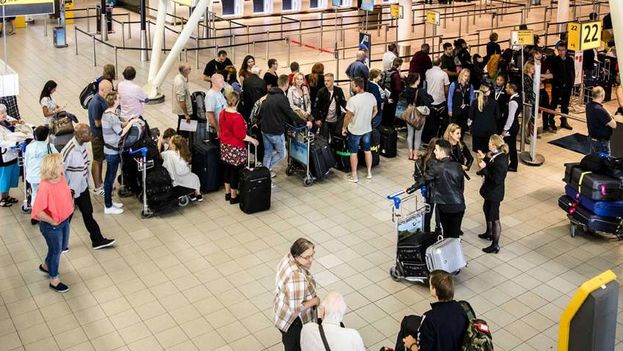
![]() 14ymedio, Havana, 30 January 2018 — A group of Cubans remains trapped at the Amsterdam-Schiphol Airport after requesting political asylum. The travelers left Havana for Moscow on Saturday and their stopover in the Netherlands coincided with the implementation of a new transit visa requirement for Cubans.
14ymedio, Havana, 30 January 2018 — A group of Cubans remains trapped at the Amsterdam-Schiphol Airport after requesting political asylum. The travelers left Havana for Moscow on Saturday and their stopover in the Netherlands coincided with the implementation of a new transit visa requirement for Cubans.
Victor Manuel Dueñas, a contributor to the Havana Times digital site, is among the Cubans who are waiting to receive political asylum in The Netherlands or, if not, to be deported to the island, according to the WPLG Local 10 website.
The increase in the number of Cubans who have requested asylum in the airports of the Netherlands in recent months caused the foreign ministry of that European nation to impose a transit visa for all Cuban travelers who stop in their territory on their way to a country outside the Schengen area.
The measure came into effect this January 29 and has left in a legal limbo travelers who arrived in Holland on that date.
Dueñas, 23, is also an LGBTI activist who managed the Community Culture Center, a meeting place for human rights lawyers who focus their work on defending this community on the Island.
The headquarters of the independent group was the house of the Dueñas family in Santo Domingo, in Villa Clara, which was seriously damaged by Hurricane Irma last September. The activist also complains that he has been the victim of pressures because the authorities do not look kindly on his work.
“We are the last to arrive at the airport in Amsterdam” without a transit visa, Dueñas told the press. “There are some who have been waiting here for five days for diplomatic officials.”
Dueñas’s cousin, Onasis Torres, and five other Cubans, were at the airport until Monday night while the authorities reviewed their request for asylum in the European Union.
Since the Administration of Barack Obama put an end to the wet foot/dry foot policy in January 2017, Cubans “continue to leave the island in search of opportunities and freedom, but their migration routes have changed,” say the young people. Europe has become a new route for those who decide to leave the country.
Dueñas says that on the Island the police continue to look at members of the LGBTI community as if they were “sex workers.” He complains, “They treat us like second-class citizens.”
The new transit visa that The Netherlands requires has a price of 71 CUC and “will allow the authorities to better evaluate the travel intentions of visa applicants,” said the foreign ministry of that European country in a recent statement.
The measure had already been applied previously by Spain, which requires transit visas for island residents who use their airports as a stopover on the way to countries outside the Schengen area. France, another of the most frequent transshipment points from Cuba, has not yet imposed that requirement.
____________________________
The 14ymedio team is committed to serious journalism that reflects the reality of deep Cuba. Thank you for joining us on this long road. We invite you to continue supporting us, but this time by becoming a member of 14ymedio. Together we can continue to transform journalism in Cuba.
